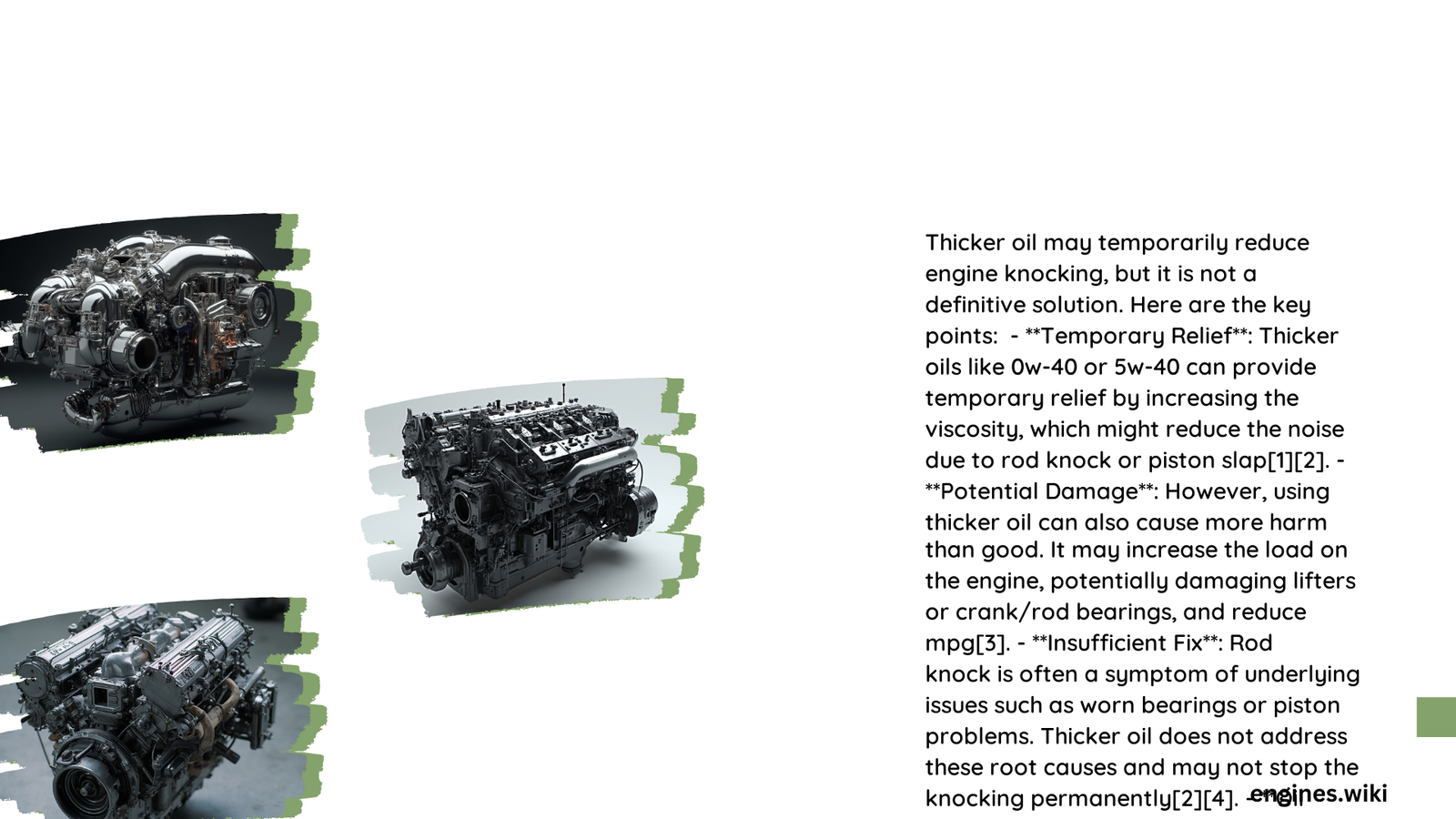Engine knocking is a complex mechanical issue that many vehicle owners face, often wondering whether simply changing to a thicker oil can resolve their problem. While thicker oil might provide temporary noise reduction, it’s not a comprehensive solution for underlying engine component wear. Mechanics and automotive experts agree that addressing the root cause of engine knocking requires a more nuanced approach than merely switching oil viscosity.
What Causes Engine Knocking?
Engine knocking can stem from multiple mechanical issues:
- Worn Rod Bearings
- Excessive play between connecting rod and crankshaft
- Creates metallic tapping or knocking sounds
-
Requires precise mechanical intervention
-
Piston Slap
- Occurs due to worn piston skirts
- Generates rhythmic tapping noise
- Indicates significant internal engine wear
Can Thicker Oil Provide Temporary Relief?

| Oil Viscosity | Potential Impact | Recommended Usage |
|---|---|---|
| 5W-30 | Standard Manufacturer Recommendation | Primary Engine Specification |
| 10W-40 | Slight Noise Reduction | High Mileage Vehicles |
| 20W-50 | Temporary Noise Masking | Older Engines |
Limitations of Thicker Oil
Thicker oil presents several critical limitations:
- Reduced Fuel Efficiency: Increased viscosity creates more engine resistance
- Potential Lubrication Challenges: Harder oil flow can compromise critical engine components
- Temporary Noise Suppression: Does not address fundamental mechanical issues
Professional Diagnostic Approach
Automotive experts recommend:
- Professional engine inspection
- Precise component measurement
- Comprehensive wear assessment
- Targeted repair strategy
When to Consider Oil Change
✅ Recommended Scenarios:
– Minor engine wear
– High-mileage vehicles
– Manufacturer-approved viscosity modifications
❌ Avoid Oil Change When:
– Significant mechanical damage exists
– Knocking indicates severe component failure
– Professional diagnosis suggests comprehensive repair
Expert Recommendations
Top mechanics suggest:
- Always follow manufacturer’s oil specifications
- Use high-quality synthetic oils
- Regular maintenance prevents premature wear
- Address knocking sounds immediately
Cost-Effective Solutions
Budget-Friendly Approaches:
– Early diagnostic assessment
– Preventative maintenance
– Gradual component replacement
– Strategic oil selection
Technical Insights
Thicker oil might temporarily mask engine knocking by:
– Creating marginally improved lubrication
– Reducing friction between worn components
– Providing minimal sound dampening
Critical Warning Signs
Immediate Action Required:
– Persistent knocking sounds
– Reduced engine performance
– Increased oil consumption
– Visible metal particles in oil
Final Technical Assessment
While thicker oil can offer momentary relief, it is not a definitive solution for engine knocking. Professional mechanical intervention remains the most reliable approach to resolving underlying issues.
Recommended Next Steps
- Professional engine diagnostic
- Comprehensive wear assessment
- Targeted repair strategy
- Regular maintenance schedule
Pro Tip: Never ignore persistent engine knocking, as it could indicate severe mechanical problems requiring immediate attention.
References:
– DSMtuners.com – Oil and Knock Discussion
– Subaruoutback.org – Rod Knock Insights
– Nate’s Interactive Auto – Oil Stabilizer Analysis
